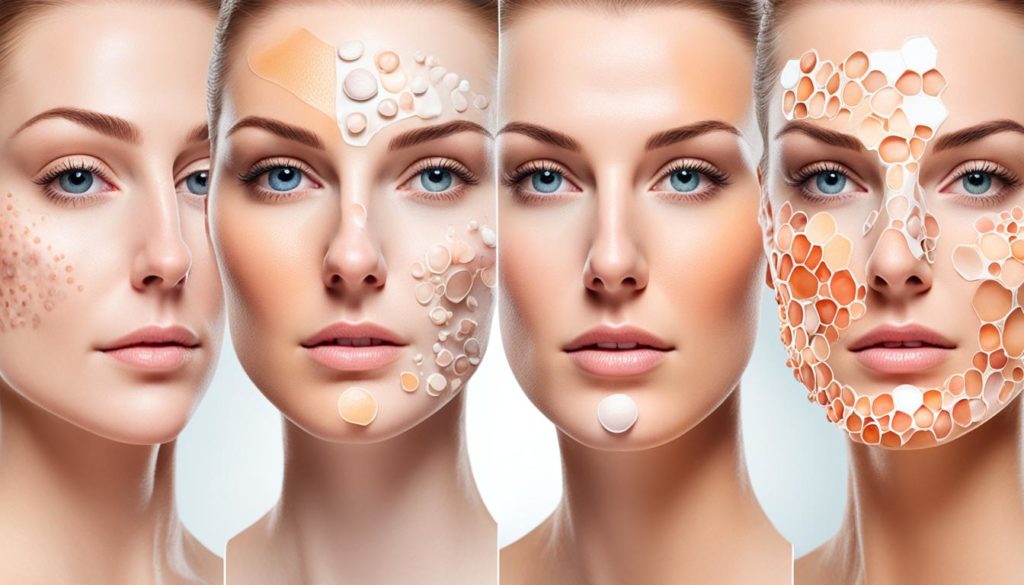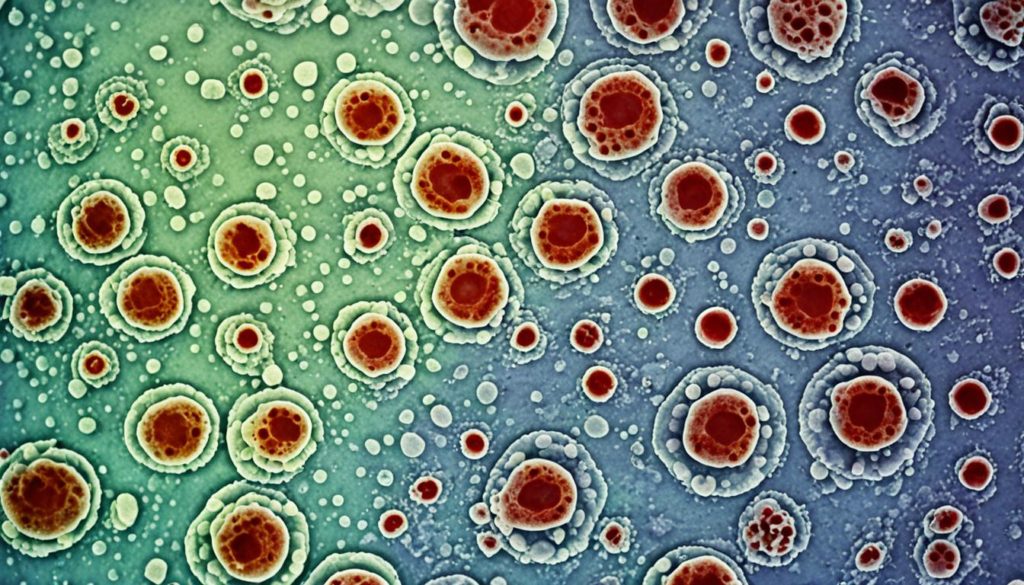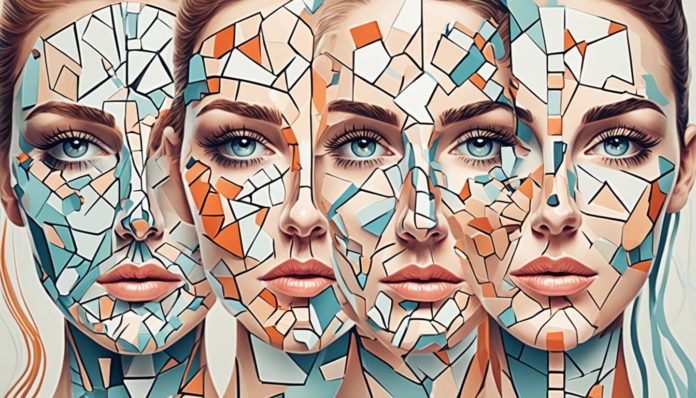Acne is a common skin problem that affects many Americans, from teenagers to adults. Everyone wants clear skin. This article shares insights into acne causes and offers skincare solutions. Knowing about acne is key for both health and confidence. The American Academy of Dermatology says up to 50 million Americans get acne each year. This makes it a top skin issue. This guide gives info on main causes and treatments. It’s for those looking for how to handle acne.
Key Takeaways
- Acne is a widespread skin condition impacting millions of Americans.
- Both physical and psychological effects of acne underscore the importance of finding effective acne treatment.
- Understanding acne causes helps in developing efficient skincare solutions.
- The American Academy of Dermatology reports up to 50 million cases of acne annually.
- This article aims to educate and provide actionable advice for achieving clear skin and acne prevention.
What Is Acne
Acne is a common skin issue that affects millions around the globe. It shows up as various lesions like comedones (blackheads and whiteheads), papules, pustules, and even cysts. We’ll look into what acne is medically and the types people may face.

Definition of Acne
Acne is a long-term skin problem. It happens when hair follicles get clogged with oil and dead skin. This causes different lesions, including comedones, which are blackheads and whiteheads. The American Academy of Dermatology has categorized acne into several groups. Knowing these categories helps in treating acne effectively.
Types of Acne
There are two main kinds of acne: inflammatory and non-inflammatory. Knowing the types helps find the best treatment options.
Inflammatory Acne: This kind includes red, swollen pimples like papules, pustules, nodules, and cystic acne. It’s harder to treat inflammatory acne. Often, both topical and oral medications are needed.
Non-Inflammatory Acne: This category covers blackheads and whiteheads. Blackheads occur when pores clog with sebum and dead skin but stay open, making them look dark. Whiteheads happen when these clogged pores close, creating small white bumps under the skin.
| Type of Acne | Characteristics |
|---|---|
| Inflammatory Acne | Includes papules, pustules, nodules, and cystic acne. Red and swollen. |
| Non-Inflammatory Acne | Includes blackheads and whiteheads. Not red and swollen. |
Common Causes of Acne
Acne is a skin problem with many causes. Knowing these triggers helps manage and treat it effectively.
Hormonal Changes
Hormonal changes are a big reason for acne. This kind of acne can happen at puberty, during pregnancy, with menstrual cycles, or from endocrine disorders. These changes make the skin produce more oil. This extra oil can block pores and lead to acne.
Bacteria and Inflammation
One key player in acne is P. acnes bacteria. These bacteria live in hair follicles. They can grow quickly, causing skin inflammation. The body fights this growth with its immune system. This fight leads to the pimples and cysts that mark acne.

Poor Skincare Regimens
A bad acne skincare routine can make acne worse. Harsh products, not cleaning well enough, or not taking off makeup can plug pores. Good skincare habits are key. They keep skin clear and stop new breakouts.
Understanding Acne Triggers
Several things from our daily life can lead to acne triggers, causing unexpected flare-ups. Stress is a big player here, negatively affecting our skin. Research links stress and acne together, showing how stress hormones boost sebum production, making acne worse. This hormonal change is crucial in knowing why acne happens.
Things like pollution and humidity also play a role in worsening acne. These elements can block your pores and cause inflammation. When air pollutants mix with our skin’s sweat and oils, they block pores. High humidity does the same by increasing oil production, which then clogs pores even more.
Makeup and skincare choices matter too. Some cosmetics and skincare products can block pores, causing pimples. It’s important to pick products that let your skin breathe to avoid acne. Knowing what worsens acne is key in keeping skin clear.
| Acne Trigger | Impact on Skin |
|---|---|
| Stress | Increases cortisol levels, leading to higher sebum production |
| Pollution | Settles on the skin, clogs pores due to mixed sweat and oils |
| Humidity | Heightens oil production, leading to clogged pores |
| Occlusive Makeup | Blocks pores, potentially causing breakouts |
Understanding and avoiding acne triggers can improve your skin health. Updating your skincare routine based on this knowledge can prevent future breakouts. Taking steps to learn about these triggers is crucial for clearer skin.
Diet and Acne
Understanding how diet affects acne is key for good skin care. Recent studies show certain foods may worsen acne. Others can actually help your skin. Let’s explore how what you eat impacts acne.
Foods That May Worsen Acne
High glycemic foods like white bread and sugary snacks spike your blood sugar. This can increase sebum production, clogging pores and making acne worse. Dairy products might also affect hormones and lead to breakouts. Knowing which foods to avoid is crucial for an acne diet plan.
Foods That May Improve Skin Health
Eating antioxidant-rich foods is great for your skin. Antioxidants reduce inflammation and fight oxidative stress, which can cause acne. Foods loaded with omega-3 fatty acids, like salmon, chia seeds, and walnuts, are good too. They have anti-inflammatory effects that may help with acne.
By choosing beneficial foods and steering clear of high glycemic foods and dairy, you can help manage your acne. This approach is a smart way to take care of your skin.
Effective Over-the-Counter Acne Treatments
OTC acne treatments are key in fighting and managing acne. Benzoyl peroxide and salicylic acid are very effective in these products. They work differently to suit various skin types and acne levels. Knowing how to use these ingredients is crucial for anyone dealing with acne.
Benzoyl Peroxide
Benzoyl peroxide is great because it kills the bacteria that cause acne. It lowers the amount of bacteria on the skin. This prevents inflammation and stops new pimples. It comes in different strengths, from 2.5% to 10%. Start with a low concentration to avoid irritation, then increase if your skin can handle it.
Salicylic Acid
Salicylic acid works by exfoliating the skin and clearing pores. It removes dead skin cells and helps stop new acne from starting. It also has anti-inflammatory properties, great for blackheads and whiteheads. Using salicylic acid regularly can make your skin clearer and smoother. OTC products mostly have 0.5% to 2% salicylic acid. It’s vital to follow the instructions to prevent skin dryness or irritation.
| Feature | Benzoyl Peroxide | Salicylic Acid |
|---|---|---|
| Primary Action | Kills acne-causing bacteria | Exfoliates and unclogs pores |
| Additional Benefits | Reduces inflammation | Reduces inflammation and prevents new lesions |
| Common Concentrations | 2.5% to 10% | 0.5% to 2% |
| Ideal For | Moderate to severe acne | Mild to moderate acne, blackheads, whiteheads |
Benzoyl peroxide and salicylic acid are important in many OTC acne products. Choosing the right treatment for your acne type and skin is vital. A dermatologist can offer personalized advice for a safe and effective acne care plan.
Prescription Acne Treatments
If over-the-counter options don’t work, prescription acne treatments may help those with tough acne. Dermatologists often mix topical and oral treatments for the best fit. This approach is based on your skin type and acne severity.
Topical Retinoids
Topical retinoids are powerful against acne. They come from vitamin A. These treatments help by speeding up cell turnover and keeping pores clear. Choices include tretinoin (Retin-A), adapalene (Differin), and tazarotene (Tazorac).
Studies show these options improve acne symptoms. Yet, they might cause dryness or irritation at first. Starting with a lower dose and increasing it slowly can lessen these issues.
Oral Antibiotics
When topical treatments don’t work, oral antibiotics might help. They target bacteria and reduce inflammation. Some common antibiotics are doxycycline, minocycline, and erythromycin.
Listening to a dermatologist’s advice is key to avoid making bacteria resistant. They recommend the right dosage and length of treatment. This strategy helps get the best results with fewer side effects.
Natural Remedies for Acne
Looking for a different way to handle acne? Natural skin care solutions are here to help. Tea tree oil is a big deal for its germ-fighting abilities. It can cut down on acne-causing bacteria and lessen swelling.
Herbal acne treatment is more than just tea tree oil. Take green tea extract, packed with antioxidants, it helps lower oil creation and swelling. These home remedies for acne provide a soft yet strong option for better skin.
When digging deeper into home remedies for acne, witch hazel and aloe vera stand out. Witch hazel, as an astringent, minimizes skin’s oiliness. Aloe vera is celebrated for its ability to heal and calm the skin. They offer a comprehensive way to manage skin using natural skin care.
Here’s a comparative overview of popular natural remedies for acne:
| Natural Acne Remedy | Main Benefit | Potential Drawbacks |
|---|---|---|
| Tea Tree Oil | Antimicrobial, Reduces Inflammation | Possible Skin Irritation |
| Green Tea Extract | Rich in Antioxidants, Reduces Sebum | Limited Evidence of Efficacy |
| Witch Hazel | Reduces Oiliness, Tightens Skin | Can Be Too Drying |
| Aloe Vera | Soothing, Healing Properties | Possible Allergic Reactions |
These herbal acne treatments might be the change you’re searching for, especially for natural product fans. Even though results can vary, their possible advantages could make them a key part of fighting acne.
Role of Skincare in Managing Acne
To deal with acne well, you need a good skincare routine. This should include cleaning, scrubbing, and moisturizing your skin right. Knowing how to do these steps helps reduce acne and keeps skin healthy.
Cleansing
Cleaning your skin is very important in keeping acne away. It’s best to use gentle cleansers to not upset your skin or make acne worse. Doctors say to pick products without strong chemicals or scents. The right cleanser takes off oil, dirt, and makeup but keeps your skin’s natural moisture.
Exfoliating
Scrubbing your skin helps stop pores from getting blocked, which can cause acne. It’s good to do it often to take away dead skin and dirt from the top layer of your skin. You should use products with salicylic acid or other mild ingredients meant for acne. Still, scrubbing too much can harm your skin and increase acne, so balance is important.
Moisturizing
It’s key to keep your skin moist, even if you get acne. Use moisturizers that don’t block pores to keep your skin moist. These products help keep your skin’s top layer working right and lower the chance of it getting upset or too dry. Choose light moisturizers that are right for your skin type for the best effect.
| Step | Recommended Products | Benefits |
|---|---|---|
| Cleansing | Gentle Cleansers | Removes excess oil, dirt, and makeup without irritation |
| Exfoliating | Salicylic Acid Exfoliants | Removes dead skin cells, prevents clogged pores |
| Moisturizing | Non-Comedogenic Moisturizers | Hydrates skin without clogging pores |
A good acne care routine with the right kinds of cleansers, scrubs, and moisturizers really helps. Staying consistent and choosing wisely are the secrets to clearer, healthier skin.
Myths and Misconceptions About Acne
Acne is a complex skin issue, often misunderstood due to myths. These incorrect beliefs cause useless treatments and long-lasting distress. Knowing the truth about acne helps correct these mistakes, benefiting those afflicted.
Common Acne Myths
Many think acne is just for teens. But, it can continue into adulthood, affecting people in their 30s, 40s, and even older. Another myth is that dirty skin causes acne. Actually, washing too much or too hard can worsen it by irritating the skin and producing more oil.
The Truth About Acne
Dermatologists tell us that acne mainly comes from hormonal changes, too much sebum, and certain bacteria. It’s vital to ignore false ideas. For example, while suntanning might hide acne, it doesn’t cure it. It could even harm the skin more. Additionally, our diet can influence acne, but this link is complex and different for everyone.
Understanding true acne facts is key to managing it. A good skincare routine, proper use of treatments, and seeing dermatologists offer real help. This approach is much better than following outdated myths.
FAQ
What causes acne?
Many things can cause acne. Hormonal changes, bacteria, inflammation, and poor skincare are major factors. Hormonal changes happen during puberty, pregnancy, and from some health issues.
What are the different types of acne?
There are two main types of acne: non-inflammatory and inflammatory. Non-inflammatory acne includes blackheads and whiteheads. Papules, pustules, nodules, and cysts make up inflammatory acne.
How can I prevent acne?
Keeping your skin clean is key to preventing acne. Avoid heavy makeup, manage stress, and stay away from certain foods. Use skin products that don’t clog pores, and don’t forget to exfoliate.
Are there any natural remedies for acne?
Yes, natural remedies like tea tree oil and green tea extract can help. But their success can vary. Always talk to a skincare expert before trying new treatments at home.
What over-the-counter products are effective for treating acne?
Benzoyl peroxide and salicylic acid are great for treating acne. Benzoyl peroxide kills bacteria. Salicylic acid helps remove dead skin and unclog pores.
When should I see a dermatologist for my acne?
If store-bought products don’t work or your acne is severe, see a dermatologist. They can offer stronger treatments like retinoids or antibiotics.
Can diet really affect my acne?
Yes, what you eat can impact acne. Foods with high glycemic indexes and dairy might make it worse. Antioxidants and omega-3 fatty acids could help your skin.
Is stress a trigger for acne?
Absolutely, stress can make acne worse. It increases sebum, which clogs pores and causes inflammation. Try relaxing activities and lifestyle changes to manage stress.
Are there any myths about acne I should be aware of?
There are myths like “only teens get acne” and “sun heals acne.” Wrong. Acne can happen at any age, and the sun can harm and inflame your skin.


